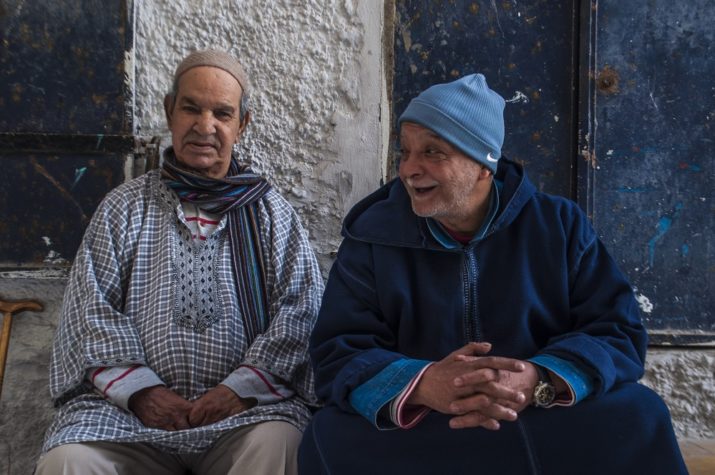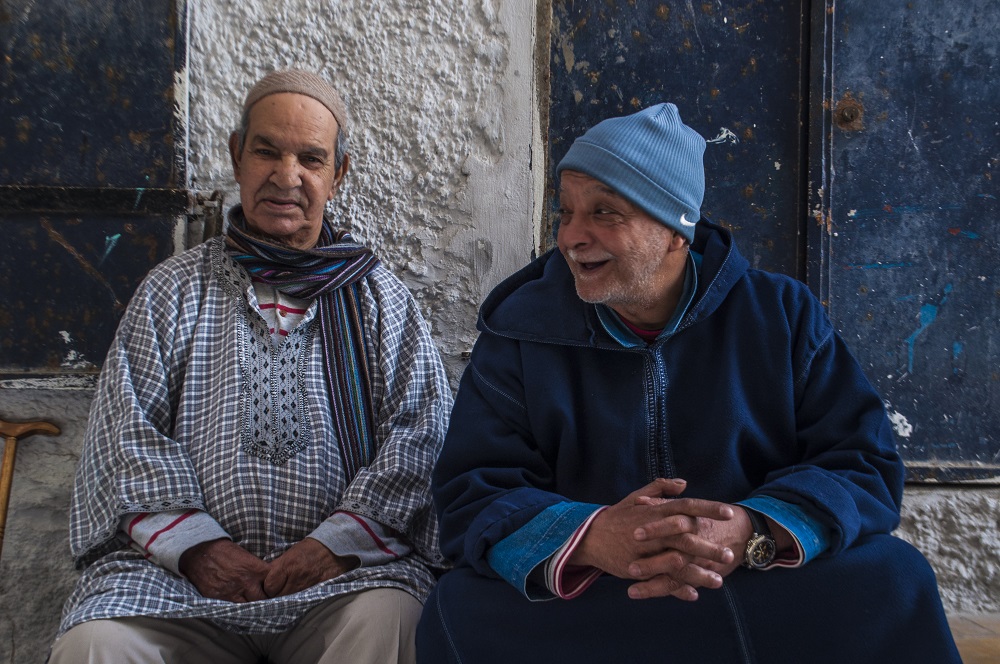

This is part of our special feature, Beyond Eurafrica: Encounters in a Globalized World.
In 2014, France’s government proposed a controversial revision to its system of family allowances. Henceforth, they would no longer be doled out in equal amounts to all families with the requisite number of children; instead they would be partially means tested. Some individuals who stood to see their allowances reduced were unsurprisingly angry. In opposing this revision, they expressed a sense of entitlement to this benefit rooted in ideas of universalism, evoking the state’s commitment to supporting all children, regardless of family income.[1]
These arguments are the product of a long history stretching back to the early twentieth century. Family allowances first emerged as a private initiative introduced by major employers interested to varying degrees in undermining labor unions, alleviating the poverty of workers with families, and encouraging a higher birthrate.[2] In 1932, the state assumed control of and expanded family allowances. In this period and the decades that followed, family allowances were not means tested and were never envisioned as a method of redistributing income. Rather, they reflected the state’s growing recognition of the social importance of raising children and commitment to encouraging population growth. Suffering from a low birthrate since the late eighteenth century, France experienced slow population growth over the course of the nineteenth century that failed to keep pace with that of neighboring European rivals. These demographic trends produced considerable anxiety, ultimately culminating in a strong state commitment to developing policies that would encourage a higher birthrate. Years of intense pronatalist lobbying and state family policy converged to advance the idea that the family unit, as opposed to the individual, was worthy of governmental support. This emphasis on family and pronatalism shaped the development of the welfare state and administration of family allowances in the years prior to and following the Second World War.[3]
France’s position as an “imperial nation-state” and the realities of migration within the larger imperial “web,” nevertheless produced questions about who should receive family allowances.[4] France’s family policy, of which family allowances were a part, was developed with assumptions of race in mind as race informed legislators’ and reformers’ ideas about what it meant to encourage “French” population growth. It was in the colonies that conflicts over entitlements to family benefits first challenged the racial and nationalist foundations of French family policy. In colonial North Africa, French officials initially sought unsuccessfully to restrict family benefits to French settlers, hoping to encourage a higher birthrate in this population deemed both too small and increasing too slowly. They hoped to find legal ways around extending family benefits to the colonized population that they perceived to be both too numerous relative to the French settlers and already experiencing a high birthrate without financial support.
This article will explore how ideas of race, differential fertility, and entitlement informed debates about family allowances for Moroccan workers. As Moroccans migrated to France and sought equal access to family allowances through their employment, they challenged the structures that colonial officials considered fundamental to managing colonized populations and restricting individuals’ rights and access to benefits. On the one hand, these conflicts over family allowances in both France and its empire can be read as an attempt by colonial officials to resist the wide-ranging changes that France and its empire were undergoing in the post-war period. The new postwar language of empire disavowed racism, stressing instead a partnership of equals and France’s investment in the long-term economic growth of the empire. Scholars have documented how France’s postwar empire never lived up to these lofty ideals. The resistance to extending family allowances to Moroccan workers on an equal basis with their settler counterparts serves as another example of France’s failure to make good on its postwar promises. More critically, the issue of access to family allowances is revealing of the social conflicts shaping the relationship between the French state and workers in the colonies and protectorates. Pronatalist lobbying established the idea that supporting all families, irrespective of income, was a responsibility of government. By the 1940s, this sense of entitlement to family allowances, based on the principle of universalism, had transferred to the empire. Workers in Morocco, like their counterparts in France, laid claim to this benefit, making a family policy based on exclusion increasingly untenable. The sense of entitlement to state support of families is critical to understanding the evolving relationship between Moroccan workers and the French state in this period marked by growing nationalism.
Similar to France, Morocco’s system of family allowances initially emerged as a private initiative. Prior to the Second World War, this benefit existed in Morocco on a limited basis, available only to civil servants and the employees of a handful of major corporations in Casablanca.[5] In 1942, the French residential government in Morocco followed the steps taken by France’s government ten years earlier and expanded the system of family allowances in the protectorate. Henceforth, all employers in the commercial, industrial, and liberal professions were required to affiliate with a local caisse into which they deposited a set amount of money per employee to fund family allowances. Those employees who had dependent children would then receive a family allowance from this fund, beginning with the first child.[6] As was the practice in France, the state set the amounts of contributions and payments, but left the management of the caisses to local councils of employers and business leaders. Officially, the goal of family allowances was to ensure that fathers with any number of dependent children brought home larger wages, more in keeping with their needs, than their childless counterparts. Pronatalist propaganda communicated this logic by presenting family allowances as a fundamental right for French families, one that would ensure that those households with children did not suffer a lower standard of living than that enjoyed by the “selfish” childless individuals in society.[7]
While pronatalist rhetoric suggested that family size was the crucial factor determining whether workers were eligible for this benefit and how much support they would receive, there was another factor that also played a role: race. For each European worker, the employer deposited a sum of money that amounted to 5 percent of that worker’s wages.[8] In 1942, those European workers who had dependent children would then receive 100 francs per month for one child, 300 francs per month for two children, and the numbers would climb with each additional child. The amounts of these allowances rose considerably in October of 1942 and again in subsequent years.[9] For Moroccan Muslim workers, the system of family allowances was considerably less advantageous. Employers deposited less money on a per employee basis: only 1 percent of each Muslim worker’s wages. Another crucial difference is that the funds from these caisses were not paid to eligible Muslim workers directly. Instead, the money was directed to a special fund that was supposed to finance a variety of social programs directly benefiting Muslim communities. The law stipulated that these could include medical programs, subsidized housing projects, community centers, hygiene programs, etc.[10]
In explaining why they were reticent about paying family allowances to Muslim workers directly, officials made clear that they conceived of family allowances as a European form of family assistance, developed with European demographics in mind and not necessarily applicable to a colonial milieu. Ideas about differential fertility factored into this perception as officials did not evaluate the family sizes of all workers collectively, irrespective of race. Instead, they considered the workers as two separate populations, with different fertility rates and distinct levels of financial need. They asserted that because many settler workers did not have dependent children, thereby paying into the system without receiving its benefits, family allowances worked well to support the minority of settler workers who did have larger families. By contrast, officials noted that significant numbers of Moroccan Muslim workers had large families and would be eligible for the allowances, were they to be paid out on an equal basis with European settlers. More critically, however, officials thought of this benefit as more than simply a form of compensation; it was a pronatalist reward designed to encourage workers to have children and assist them if they did so. While the overall population of the protectorate had a strong birthrate, officials were solely concerned with raising that of the European settlers that was deemed too low. In these types of discussions, it is evident that a program that was a pronatalist benefit for European settlers in the protectorate generated a fair amount of anti-natalist rhetoric when officials discussed extending it to colonized Moroccans whom they considered sufficiently prolific by comparison.
In 1946, this system changed when funds were directed away from the aforementioned social programs for Muslims and paid out to qualifying Muslim employees directly. This change came from the metropole and reflected the post-war transition to the French Union as well as the new language of empire emphasizing equality and colonial reform.[11] Despite the language of equality, in practice it remained an unequal system in Morocco as Muslim workers received smaller allowances than those paid out to Europeans. In addition, whereas the state continued to envision family allowances as a means of encouraging European fertility, they were clearly hostile to the idea of supporting large Muslim families.[12] This type of thinking is seen with the proposal to place a cap on the number of children, a maximum of four, for which a Muslim worker could claim these funds.[13] To further highlight that this was a separate benefit, the money paid to Muslim workers was not even called an allocation familial, even though its funds came from the same employers and was handled by the same caisse as the allowance paid to European workers. It was instead called a sursalaire familial, or family supplement, to connote its difference.[14] By this point in time, settlers conceived of the family allowance as a fundamental right, consistent with the larger belief that fathers were entitled to financial support. It is possible that when meeting the law’s requirement that these funds be paid to eligible Muslim workers directly, officials wanted to avoid any association with family allowances or ideas of rights and entitlements.
The fact that Moroccans received smaller individual allowances was a source of conflict and one that Moroccan leaders in the representative body, the Conseil Consultatif, repeatedly raised. French officials justified this inequality on the grounds that even if they spent less on each Muslim child individually than they did on each European child, most payments went to Moroccans. Because the colonized Moroccan population was on the whole larger, the caisse system disbursed more funds to the Moroccan population as a whole.[15] Certainly racialized notions of poverty also factored into these types of justifications. Similar to what Frederick Cooper has documented for French West Africa, where family allowances were introduced for African workers between 1952 and 1956, French officials in Morocco contended that Moroccan workers could support their families with smaller wages and stipends because their cost of living was lower.[16] This conflict continued into the 1950s as officials consistently argued that raising the sursalaire familial would necessitate the unpopular solution of requiring employers to contribute more funds per employee.
Family allowances thus became a focal point in debates about rights and equality within a larger imperial framework. The issue became particularly heated as increasing numbers of Moroccans traveled to France to work in the postwar period. Because most migrated without their families, they could not claim family allowances in France for children who resided in Morocco. This was seen as a grave injustice because by law, employers in France were required to deposit funds into a caisse for each employee they hired, including their Moroccan employees. This meant that employers were depositing funds for individual Moroccan workers who could not access those funds and send them to Morocco to help support their families. This distinguished them from other colonial workers, including Algerians whose legal status of francais musulmans d’Algérie permitted them to collect family allowances in France, at the same rate that they were paid in Algeria, and send that money back to Algeria to support their children. This was likewise true of colonial workers from French colonies, as they had citizenship in the French Union.[17]
The issue of family allowances for Moroccan workers in France became very contentious. The foreign ministry and colonial officials in Morocco recognized that this conflict had the potential to cause considerable unrest in both Morocco and France in a period when tensions were running high in France’s colonies and protectorates.[18] Still, the French government was reticent about extending family allowances to Moroccans working in France, insisting that they were foreigners. More to the point, they expressed fears that the family allowance could become a “veritable expatriation incentive” with implications for both Morocco’s economy and France’s social order.[19] Among those who nevertheless supported extending family allowances to Moroccan and Tunisian workers in the interest of maintaining social peace was Jacques Doublet, representing the Ministry of Work and Social Security. Recognizing how France’s relationship with its empire had changed in just a short period of time, Doublet argued in 1952 that it would be politically expedient to examine ways of extending family allowances to these workers. Doublet was troubled by the political implications of withholding these funds from Moroccan workers who had come, like their French counterparts, to see it as an entitlement.[20] Though France eventually instituted a procedure by which Moroccan workers in France could claim family allowances on behalf of dependent children residing in Morocco, the delay in doing so undermined postwar claims of partnership and equality within the empire.
In conclusion, family allowances began as a right guaranteed by the state to French citizens in both France and Morocco. The original idea was that these funds would encourage a stronger French birthrate by enabling French workers with families to enjoy a standard of living more comparable to that of their childless coworkers. By the post-war period, it was a well-established idea that the state had an obligation to support families and that workers with children were entitled to financial support. As these ideas transferred to the empire, Moroccan leaders became more vocal in demanding equal treatment. They rejected first the practice of not paying family allowances to Moroccan workers directly and then later paying them a smaller sursalaire instead of the full allowance. In the context of post-war imperialism and the French Union, there was an expectation of equality in treatment between workers regardless of race. Moroccan workers in France and Morocco threatened labor unrest and pushed for equal treatment, illustrating how migration between France and Morocco made a racial division in family policy increasingly untenable. While in France, Moroccan workers sought access to the family benefits their employers paid on their behalf, so they could send it back to their families in Morocco. By crossing borders, therefore, they challenged the structures that colonial officials considered to be so fundamental to managing colonized populations. More critically, this sense of entitlement to family benefits that developed both in France and in its colonies and protectorates is critical to understanding this period marked by growing nationalist unrest.
Margaret Andersen is associate professor of history at the University of Tennessee, Knoxville. She is the author of Regeneration through Empire: French Pronatalists and Colonial Settlement in the Third Republic, 1870-1940, published by University of Nebraska Press in 2015.
Photo: Morocco, Muslim men seated in the narrow alleys of Tangier, the Moroccan city on the Maghreb coast with its unique blend of cultures, for centuries the Europe’s gateway to Africa | Shutterstock
References
[1] Hugh Schofield, “French welfare changes spark debate over ‘universality’” BBC November 10, 2014. http://www.bbc.com/news/world-europe-29984290
[2] See Susan Pedersen, Family, Dependence, and the Origin of the Welfare State. Cambridge: Cambridge University Press, 1995.
[3] See Paul Dutton, Origins of the French Welfare State: The Struggle for Social Reform in France 1914-1917 Cambridge University Press, 2002 and Laura Levine Frader, Breadwinners and Citizens: Gender in the Making of the French Social Model. Durham and London: Duke University Press, 2008.
[4] On the concept of France as an “imperial nation-state” see Gary Wilder, The French Imperial Nation-State: Negritude and Colonial Humanism between the Two World Wars. Chicago: University of Chicago Press, 2005. On the concept of “webs of empire” see Tony Ballantyne, “Rereading the Archive and Opening up the Nation-State” in Antoinette Burton ed. After the Imperial Turn. Duke University Press, 2003.
[5] Archives Diplomatiques (AD): Protectorat français au Maroc: Direction de l’intérieur: Santé et hygiène publique: Familles nombreuse: Famille 1 MA/200/633: “La Caisse d’aide sociale du Maroc” Fédération des unions régionales des familles françaises du Maroc: Bulletin d’information, no. 2 (July 1942), 2.
[6] In France, by contrast, family allowances began with the second child.
[7] For instance, this logic can be seen in the bulletins of the Fédération des unions régionales des familles françaises du Maroc.
[8] AD: 1MA/10/160 Cabinet du Délégué à la Résidence Générale: Santé, Affaires Sociales: Famille: “Caisse d’aide sociale”, 2.
[9] Ibid, 3.
[10] Ibid, 6.
[11] Though Morocco, was not part of the French Union, the new approach to imperialism that followed the war also shaped many of the decisions made in Paris concerning Morocco.
[12] For instance, this type of thinking comes up when officials in Morocco wrote to Paris asking for a subvention. Archives du Ministère des Affaires Etrangères (AMAE): 24QO/487: Affaires Marocaines et Tunisiennes, 1944-1955, Letter dated 24 September 1945 from Gabriel Puaux, résident général in Morocco, to the minister of finances in Paris.
[13] AMAE: 24QO/637: Travailleurs marocains en France: étude des conditions de travail et de recrutement, allocations familiales, secteurs d’emplois: Letter dated September 17, 1947 from the Secretary General of the Protectorate, Work and Social Questions Services to the Civil Controller of Africa-Levant in the Foreign Ministry.
[14] AD: 1MA/10/160 Cabinet du Délégué à la Résidence Générale: Santé, Affaires Sociales: Famille: Letter dated March 2, 1950 from the Direction de la Santé publique et de la famille to the Délégué à la résidence générale, 2.
[15] AD: 1MA/10/160 Cabinet du Délégué à la Résidence Générale: Santé, Affaires Sociales: Famille: “Caisse d’Aide Sociale: Rapport du Conseil d’Administration sur l’Exercise 1951” According to this document, in 1950 they spent 17,377 francs annually per European child and 6,000 francs annually per Moroccan child.
[16] On French West Africa, see Frederick Cooper, Decolonization and African Society. Cambridge: Cambridge University Press, 1996.
[17] AMAE: 24 QO/637: Travailleurs marocains en France: étude des conditions de travail et de recrutement, allocations familiales, secteurs d’emplois
[18] AMAE: 24 QO/637: Travailleurs marocains en France: letter dated 22 November 1948 from the Civil Controller, head of the Social Services of the Office du Maroc to director of Africa-Levant, Ministry of Foreign Affairs.
[19] AMAE: 24QO/637: Travailleurs marocains en France: letter dated June 27, 1946, #1071 from the Minister of Foreign Affairs to the Resident General in Rabat.
[20] Archives Nationales de France (AN): 19760173/65: Ministère de la Santé: Prestations Familiales: Départements d’Outre-Mer: Tunisie: Letter dated October 11, 1952 from Jacques Doublet to the Ministry of Public Health and Population.
Published on March 1, 2018.




